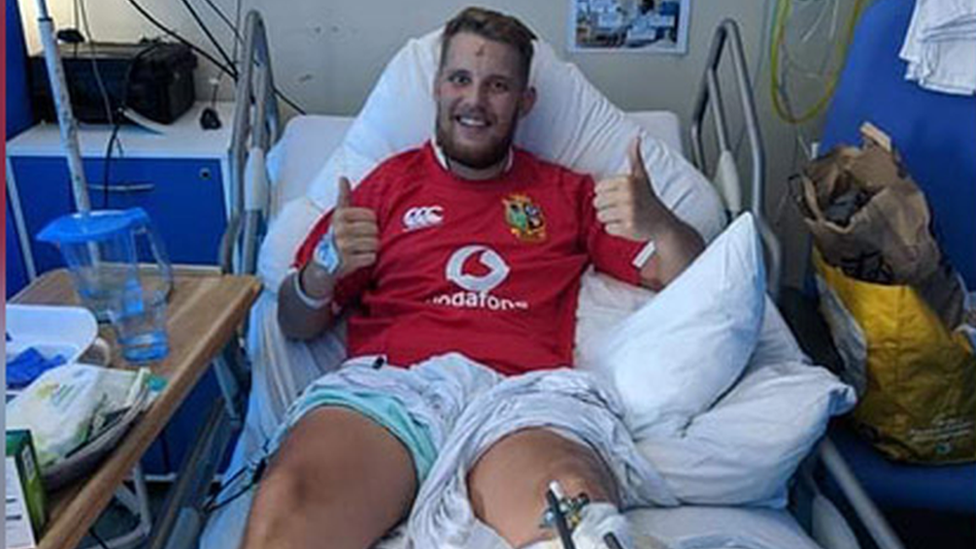Crash Detectives: Fatal wrong-way M4 crash haunts near-miss drivers
- Published
Gwent Police officer Dean Burnett said you can only imagine what the swerving drivers were thinking
A wave of desperate 999 calls reported a car travelling the wrong way along the M4 motorway one February night.
Help wasn't able to arrive in time to stop it ending with one driver dead and another seriously injured.
The BBC Crash Detectives series producer describes how one driver's actions can have a far reaching and lasting impact on numerous lives.

The callers
It was edging close to 22:30 on a Friday night in 2019, with traffic flow on the M4 busier than normal.
Penny Roberts and her family had spent the week in London and were now among that traffic, heading home to west Wales.
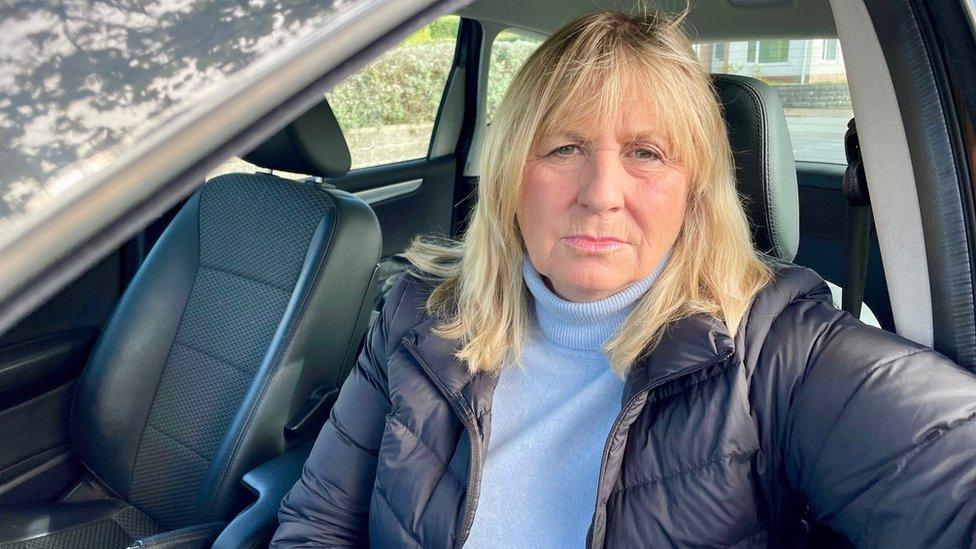
Penny Roberts believes her decision to ask partner Mark to drive may well have saved their lives
It was such a regular journey that she, and her partner Mark, had an established routine to share the driving.
As they neared Newport it would normally be her turn to drive, but that night Mark was at the wheel.
"We'd stopped at junction 24 to get coffee, I just didn't feel like driving so asked Mark to carry on instead," she recalls.
"I'm just so relieved that he did. I'm not sure we'd still be here if it wasn't for him."
They finished their coffees and rejoined the westbound carriageway, cruising at about 65mph.
Penny rode in the passenger seat of her small Mercedes A class car. Her 23-year-old daughter, boyfriend and the family dog squeezed in the back seat; the boot crammed full of luggage.
They passed the slip road for junction 26 at Malpas, and were gaining steadily on the car in front when Mark indicated and moved out to the middle lane to overtake.
"At that point we were heading uphill, and all I could see ahead of me was red tail lights," he said.
And then he did a double take.
"Amongst all the red, I saw the glare of white headlights, moving across from the left. I then realised very quickly that a car was on the wrong side of the road and it was coming towards us, at speed."
He stayed calm and planned a course of action.
'Absolutely terrifying'
"I decided to stay in the middle lane and just concentrate totally on the vehicle coming at us, on the grounds that if they swerved I would have to take evasive action," he said.
A tense five or six seconds ticked by, before the silver Vauxhall Astra careered past in the outside lane, just half a metre from the driver side of their car.
Mark recalls looking in his rear view mirror to see the car behind them veering across all three lanes as its driver desperately avoided a collision.
"It all happened in a split second, but it was absolutely terrifying," said Penny.
"Mark's a very good driver - he saw the car and kept his nerve.
"I don't know how he had time to comprehend all of that, but he did. I can't be sure that I would have done the same."
Penny, a former BBC Wales journalist, took out her phone and joined the flurry of motorists frantically dialling 999.
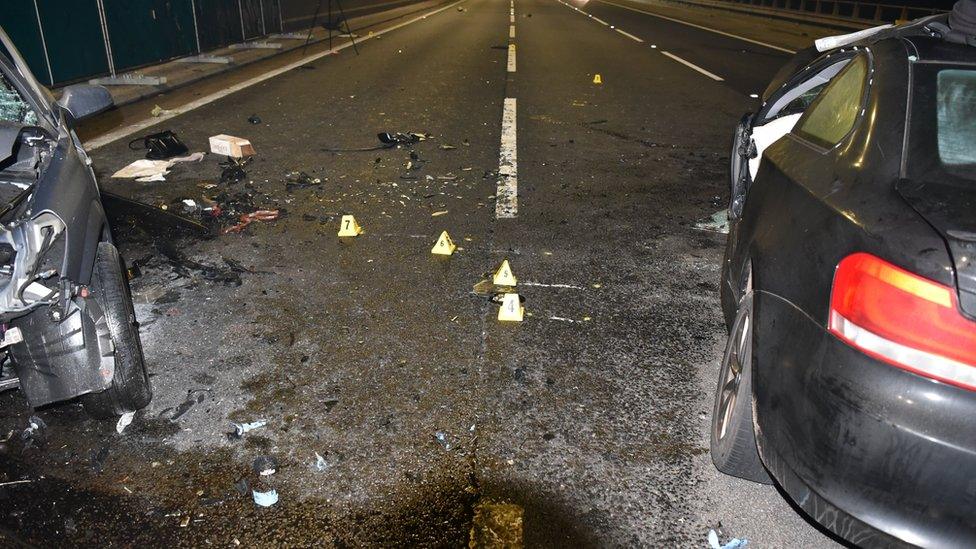
The Vauxhall Astra continued driving the wrong way on the M4 before colliding with a BMW
At the same time, Shifa Begum and her husband Walie were on the eastbound carriageway, travelling home to Weston-super-Mare.
Their three children, aged 10, six and 15 months, were all fast asleep in the back.
Her husband, who was driving, suddenly asked: "Can you see that? There's a car - it's going the wrong way!"
She looked to her right, and saw they were keeping pace with a car as it travelled along the opposite carriageway.
"I grabbed my phone and called the police, but I was just so shocked that nothing was coming out of my mouth," she said.
'Just horrendous'
She put her phone on speaker and let her husband do the talking.
"He was trying to stay calm, because we didn't want to wake the kids and scare them. All I could think was that I hope that person manages to get off the road."
"It's a Vauxhall Astra I think," Walie tells the operator. "They're still going, they're not stopping."
"Are they going fast?" asks the operator.
"Well, we're doing 50 now, and ... oh! There's been a crash! They've hit a car!"
"Seeing the moment they crashed like that was just horrendous, I couldn't breathe, I felt physically sick," said Shifa.
"We slowed right down and Walie asked me should he go and help? He really wanted to stop, but we had kids in the car. I said there was no way he could just run across the motorway."
Realising they had done all they could, they carried on.
"I was literally shaking, all the way home. My legs were like jelly. I just couldn't stop thinking about it," she said.
The investigation
The silver Vauxhall Astra, which the callers had seen travelling in the wrong direction, had crashed head-on into a black one series BMW, in lane three of the westbound carriageway.
As Gwent Police forensic collision investigator Dean Burnett arrived at the scene, fire crews were working to free the 21-year-old driver of the BMW, who was seriously injured.
The 38-year-old woman at the wheel of the Astra had died.
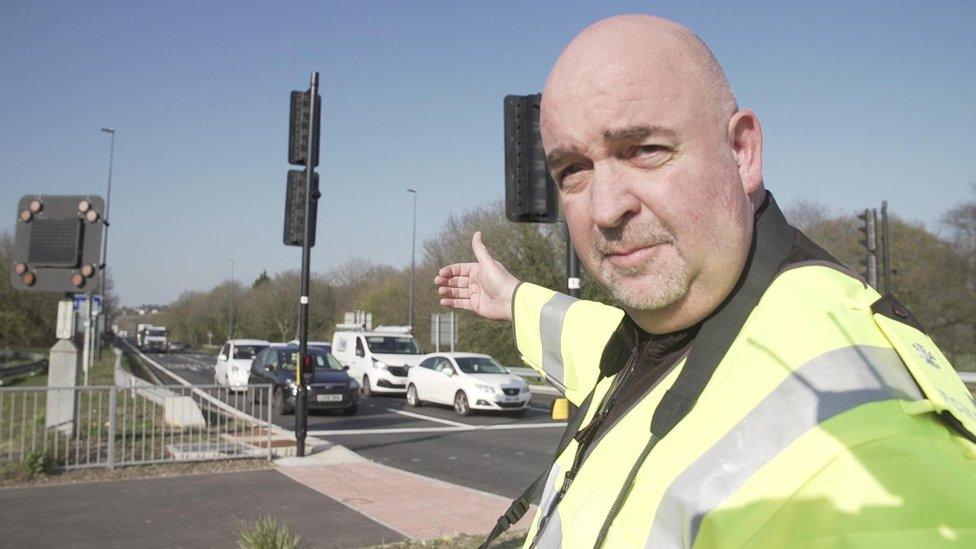
Collision investigator Dean Burnett at the junction where witnesses saw the Vauxhall Astra turn left and drive up the slip road
As Mr Burnett carried out a painstaking analysis of the scene evidence, he needed to find out why the woman was travelling on the wrong carriageway.
Inquiries revealed how horrified witnesses saw her make a left-hand turn from the intersection at junction 28 in Newport.
She lived locally, and was thought to be familiar with the junction lay out - yet still drove up the wrong slip road, towards oncoming traffic.
She then continued for 2.8 miles before crashing into the BMW - but not without numerous close calls with other vehicles in the minutes beforehand.
At an inquest into the woman's death, the coroner said it was hard to understand why the driver did not realise her mistake and pull over on to the hard shoulder.
But blood tests revealed she was two-and-a-half times the legal alcohol limit to drive and she had also taken cocaine.
'Motorways our safest roads'
Mr Burnett said: "I was under no illusions at all that that level of intoxication was a significant, if not the main contributory factor in this collision."
The 21-year-old BMW driver had life-changing injuries, but the terrifying reality faced by numerous other unsuspecting motorists that night, was captured on motorway CCTV.
With more than 20 years' experience investigating serious and fatal collisions, the impact of what he saw in the footage was not lost on Mr Burnett.
"There's some serious near misses. You can only imagine what those drivers are going through. It's horrific.
"Motorways are statistically our safest roads - because we're all going in the same direction, so the last thing you expect is something travelling towards you," said Mr Burnett.
The natural instinct for most drivers faced with that scenario, is to brake and swerve - and this is seen numerous times in the CCTV.
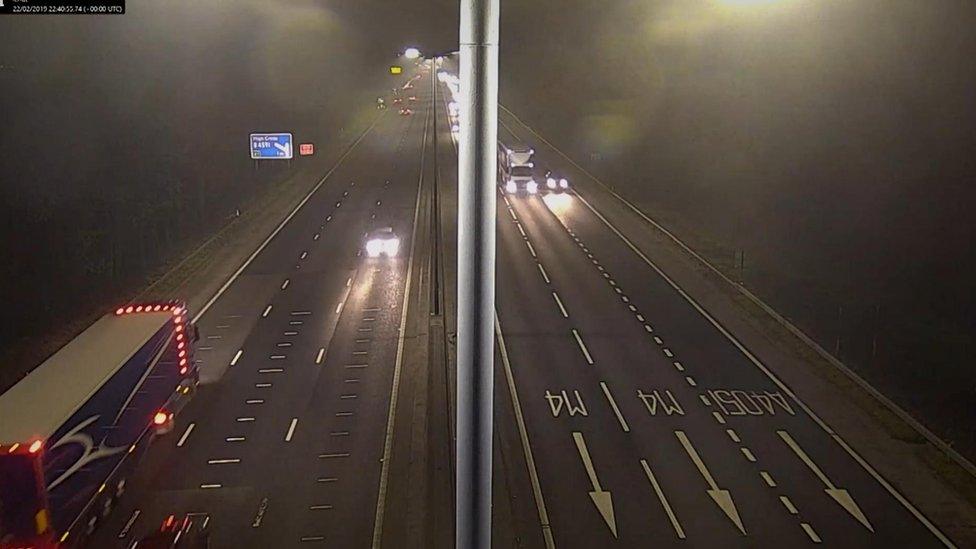
Amongst all the red lights there was the glare of white headlights
But he added that there are ways to be on guard to deal with such unexpected issues on the road - and that is to stay alert, and always be looking well ahead.
"Motorways especially are where drivers tend to switch off more, because the traffic is going in the same direction. Extend your observations at all times, so you can see any changes in road circumstances in front of you.
"It's more of an effort to do this at night, when you're tired and it's dark and you're less likely to be alert, but this is a good example of why, even when you're tired, you still need to have your wits about you."
The lasting impact
As soon as she got home, Shifa Begum began searching online, desperate to know the outcome.
"When I saw that the woman had died, I just felt numb, I've never seen anything like that before and wouldn't like to see it again."
And she pledged that from that day on, she would never drive on the motorway again.
"All these different scenarios just go through your head. I'm so scared now."
Penny Roberts is still regularly travelling between west Wales and London - but two years on, the experience is never far from her mind.
"I can't drive down that stretch of road without thinking about how we could have all been killed, and how my other daughter would have been left alone.
"I feel desperately sorry for the man who was injured, as well as the woman's family and her children. But I'm also very angry. Cars are lethal weapons, and can destroy lives.
"A matter of seconds could have been the difference between life and death for the four of us."
The story of how police pieced together what happened was shown in The Crash Detectives on BBC One Wales.
If you or someone you know has been affected by the issues raised in this article, information on available support can be found on the BBC Action Line website.

THE LONG WALK HOME: 20,000 miles, 4 years, 1 man
FORENSIC COLLISION INVESTIGATORS: Step inside the cordon with The Crash Detectives

Related topics
- Published5 October 2021
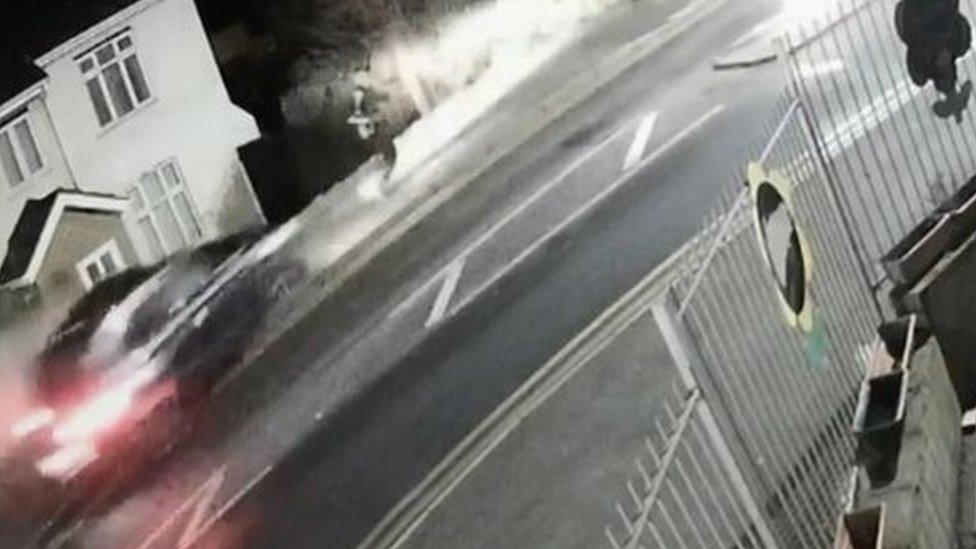
- Published30 September 2021
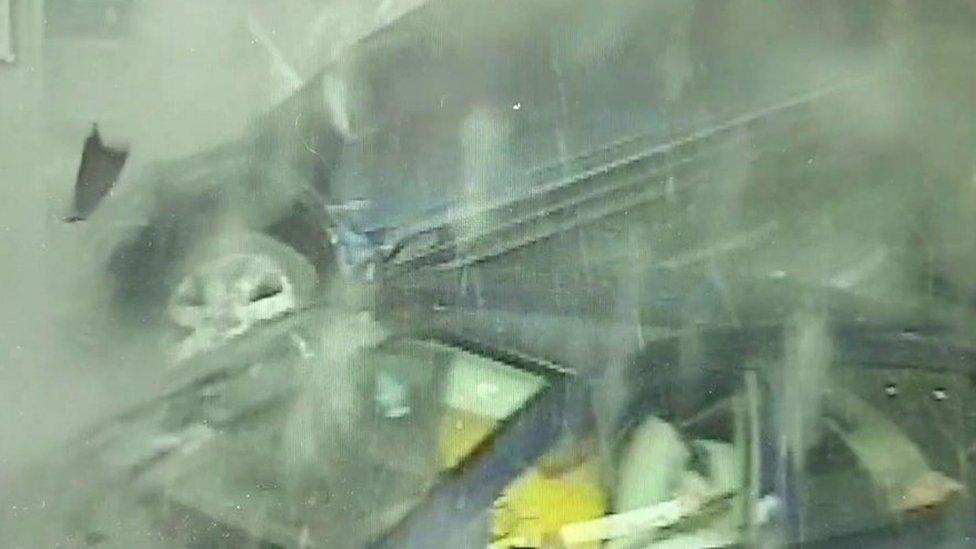
- Published27 July 2021
